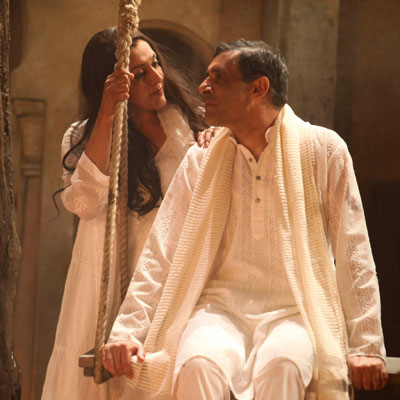I’ve just come back from India. At least that’s how it feels after a double attack of subcontinental drama. Tara Arts, in Wandsworth, has relocated Molière’s The Miser to modern India and commissioned a script from the Glaswegian standup, Hardeep Singh Kohli. He brings the two cultures together with the insouciant aplomb of an experimental chef concocting a lobster and peppercorn fruit sundae. The result may not please hardcore Molière fans, who speak in reverential tones of the master’s subtlety and elegance, his satirical adroitness and his talent for intricate and charming narrative constructions.
This is a show that confidently abandons all such sophistication. It aims for low-brow burlesque. And it scores a direct hit. On-stage musicians welcome the crowd to their seats and create an informal atmosphere like a family get-together rather than a drama. We meet Harjinder, a widowed millionaire in rags, who wants to offload his two unmarried children cheaply while finding a rich young wife for himself. He constantly urges his gadabout son to emulate the thrifty habits of Gandhi, who gave up his favourite food, mung beans, and survived on peanut butter and lemon juice instead. ‘Gandhi,’ brays Harjinder, ‘even husbanded his seed, and refused to share his wife’s bed for 50 years. Now that’s saving!’
The son is in love with the girl his father wants to marry and the daughter has fallen for the family’s handsome but skint butler. The plot feels like a Christmas panto and Jatinder Verma’s direction operates on roughly the same level. Spirited acting keeps things bubbling along. To punctuate each joke, the musicians add bongs, bangs, whoops, beeps and tra-la-las. Antony Bunsee extracts every ounce of juice from the title role and he’s well supported by Deven Modha as his bumptious son. Caroline Kilpatrick, also excellent, plays a gap-year Sloane from Dorset who has come to India to patronise it. Great work, too, from the smoky-voiced Sohini Alam whose singing talent is very nearly upstaged by the charm of her figure.
Another Indian transplant at the Noël Coward. RSC director Iqbal Khan plucks Much Ado About Nothing from Messina and crash lands it in modern Delhi. Culturally it works very well. Church becomes temple. Priest becomes pandit. No worries there. Tom Piper’s restrained and stylish set is a delight to look at. And the hierarchical culture of India, that Beatrice revolts against, offers a suitable match for the original. It’s a pity the casting isn’t so effective.
Shakespeare wrote Beatrice and Benedick as a couple of ageing fun-seekers who grow up in the course of the play and exchange youthful irresponsibility for married contentment. Both are in their late 30s, maximum. The RSC ignores that and offers us Meera Syal and Paul Bhattacharjee who aren’t quite claiming their winter fuel allowance yet but they’re certainly feeling the chill. They totter into each other’s arms like two arthritic old-stagers in early senility rather than as a pair of wised-up kids embracing domesticity.
It helps that Syal, who looks much younger than her Wikipedia age of 51, has a wonderful sense of comedy but her ebullience and her charisma make Bhattacharjee’s formal Benedick seem stiff and unattractive. With his white hair and prominent overbite, he looks more like a geeky physics teacher than a warrior-playboy. The excellent Kulvinder Ghir gives a brilliant account of Borachio as a messed-up and corpulent drunkard. Ghir, one of the finest comedians we have, deserves far meatier parts than this. He’d surely have made a better stab at Don John than the dour Gary Pillai who plays the baddie as if he’s auditioning for Macbeth.
The show has been running since August and the cast have added more and more bits of business here and there. As I entered the auditorium, the actors were larking about on stage and roaming the aisles, bantering away and blurting out mild profanities. ‘It’s the dog’s bollocks, madam,’ said one cast member to an old lady near me. This craze for improvisation continues throughout the show and the actors have been permitted to include any bit of colour they like. This unbalances the play and imperils the contract between viewer and viewed. I began to wonder if the RSC were there to entertain the audience or whether the audience were there to watch the RSC entertaining themselves.
An attentive director would be concerned that the crowd laughed so seldom at a play which is renowned as a great theatrical rarity: a Shakespearean comedy that’s actually quite funny. Little chance of a shift in direction, though. The RSC is happy with this product and we’d better be happy with it, too. The spirit of British Leyland lives.







Comments